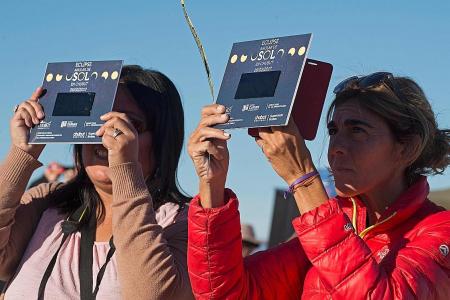Interest is sky-high for astro-tourism
This year, the big seller is the Aug 21 total eclipse of the sun
With urbanisation gaining pace and air pollution clouding the view in major cities, contemplating the stars in a pitch-black sky is fast becoming a rarity that tour operators are banking on as a selling point.
From a total solar eclipse to the Northern Lights and the Milky Way, many experts at last week's ITB Berlin, marketed as the world's leading travel trade show, were making the case for astronomical experiences this year.
"Astro-tourism is really an increasing business. We now see a lot of travel agencies that offer this kind of tourism," Mr Andreas Haenel, an astronomer and director of the planetarium museum in north-western Germany's Osnabrueck, told AFP.
With few places sufficiently dark for observations, some European and US national parks have now classed certain areas as "dark sky preserves".
Meanwhile, deserts in Namibia, Botswana and Iran are marketed as ideal stargazing sites that also offer the exoticism of sandy dunes.
But beyond just searching for familiar favourites like Orion's Belt or the Big Dipper, Mr Haenel says recent years have seen a boom in "event astro-tourism" - travelling to witness an eclipse, a meteor shower or the Northern Lights.
At the ITB show, the brochure promoting Canada's Yukon sold the moment that "you will never forget" when skies suddenly light up with colourful streaks as a result of gaseous particle collisions. Known commonly as the Northern Lights, the Aurora Borealis has become a major selling point for towns around the Arctic Circle.
INCREASING INTEREST
"There has been an increasing interest since the last four years. It has to do with our marketing, of course, and an awakening," said Ms Ellen Kachel of the Northern Norway Tourist Board, noting that demand has grown, in particular among Asian clients.
The northern Norwegian city of Tromso has seen the number of visitors explode, and every photo shared on social networks only serves to fuel further interest for the region.
But this year, the big astro-tourism seller is the Aug 21 total eclipse of the sun, which will only be visible along a stretch running from Oregon to South Carolina, cutting diagonally across the US.
"Nobody knows how many tourists are going there, the estimations go from several hundred thousands to several million people. But it seems to be becoming a great event," said Mr Haenel.
However, as the sector's popularity grows, some warn that it should be careful not to fall victim to its own success, while others feel it will have to find a balance of moderate growth that respects nature.
At the same time, astro-tourism may not be for everyone as it not only calls for patience, but also the acceptance that tonight may just not be the night.
"We never promise, that's why we call it 'hunting the Lights', you are looking for it but you don't know if you'll see it," said Ms Kachel.
After all, she added, the Aurora Borealis is a "diva" - sometimes it's just not in the mood to perform. - AFP
We are now seeing a lot of travel agencies that offer this kind of tourism.Mr Andreas Haenel
Get The New Paper on your phone with the free TNP app. Download from the Apple App Store or Google Play Store now



